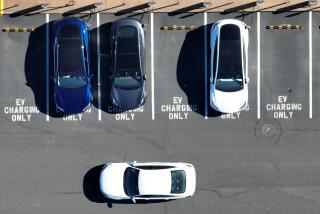Big 3 Agree on Supporting Gas Tax Hike
WASHINGTON — General Motors Corp. has joined Ford Motor Co. and Chrysler Corp. in supporting an increased gasoline tax as the way to persuade consumers to buy small cars and to meet federal gasoline-mileage requirements, Chrysler Chairman Lee Iacocca said Thursday.
The new agreement among the Big Three auto makers stakes out a unified industry position in advance of an expected confrontation next year over auto fuel efficiency and pollution control. Some members of Congress are calling for a sharp increase in federal miles-per-gallon requirements, which would require the auto industry to boost production of smaller cars. Environmentalists favor this too, since smaller cars emit less pollution than larger models.
A large increase in the federal gasoline tax would do just as much to steer customers toward smaller, higher-mileage cars, the industry contends.
This week, the gasoline tax re-emerged a remedy for the federal government’s budget woes. President-elect Bill Clinton, who campaigned against such an increase, said he had heard “a lot of good arguments” for the gas tax at his economic conference in Little Rock, Ark. But he remained concerned that a higher tax would have to be linked with other proposals to prevent an unfair burden on the middle class.
During the presidential primaries, Clinton criticized Paul Tsongas’ call to raise gasoline taxes as a way of reducing the federal budget deficit. Ross Perot also supported a large increase in the gas tax.
It is estimated that the government would take in about $1 billion for every 1-cent increase in the gasoline tax. The federal tax is now 14 cents a gallon.
Iacocca, who is retiring at the end of the month, said in an interview Thursday that the three car manufacturers recently reached informal agreement to push for a higher gasoline tax without demanding that the government ease federal fuel-efficiency standards in exchange.






